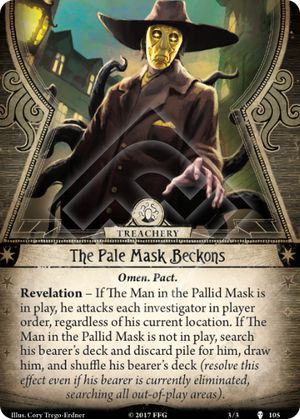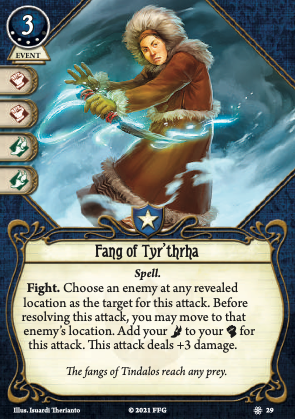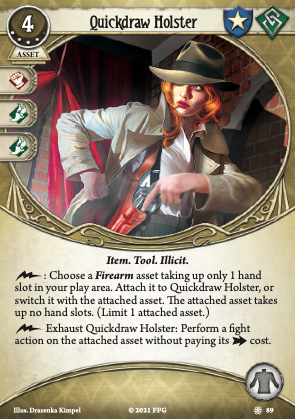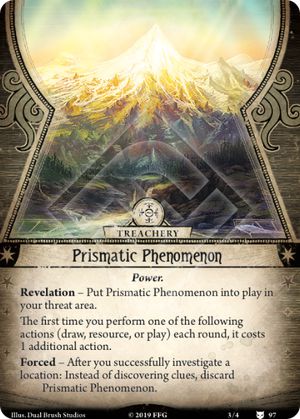
This card procs Occult Evidence, Astounding Revelation, Surprising Find, Shocking Discovery (which itself will cancel The Pale Mask Beckons' effect). Mandy's great in getting chosen as the bearer of the Man in Pallid Mask.

This card procs Occult Evidence, Astounding Revelation, Surprising Find, Shocking Discovery (which itself will cancel The Pale Mask Beckons' effect). Mandy's great in getting chosen as the bearer of the Man in Pallid Mask.

So playing yesterday as Zoey on Where the Gods Dwell, and some of you will already now know where this is going, and I draw Smite the Wicked and the first enemy I discard is a copy of Nyarlathotep.
So what's the interaction here?
I knew that StW overrode Spawn instructions but what about Peril/Hidden and Revelation effects?
In this particular instance it didn't make much difference as we were soon to fail, so I just added it to my hand and took a point of Horror damage.
But should of I spawned Nyarlathotep and he then behaves as any other Hunter Enemy?

"Choose an enemy [Elite as well]... as the target of this attack."
"You may [i.e. you may choose not to] move to that enemy's location."
Remote damage against boss monsters and humans. Every. Single. Campaign has Elite enemies that don't spawn on you directly, either because they start a pursuit from a distance, or because they're guarding a location of interest. Springfield M1903 (with current taboo) and Telescopic Sight can only remotely target non-Elite enemies. Marksmanship and Dynamite Blast are the only cards I know off that deal remote damage to Elite enemies. As a result Fang of Tyr'thrha is occupying a relative unexplored area of fighter tech, and its pushing boundaries in the process. Here's hoping it doesn't trivialize certain scenarios.
EDIT: Oh wait, in single player games where "4 health per player" means "4 health", it DOES trivialize certain scenarios.

Quickdraw holster does a nice thing:
It saves you a fight action.
It means that your first gunshot per turn is a free action, use it with a Lupara or Sawed-Off Shotgun, maybe Vicious Blow, to nuke moderate enemies or chunk a boss right as you step into their location. Use it with smaller guns like .45 Automatic to do 4 fights in a turn or clean up chaff efficiently.
But.
It costs 4 resources.
It does nothing by itself. Nothing! You still need to find the gun and pay for it.
It's 4 XP.
It has trouble with timing. (if you have, say, some tools or a 2-hand gun in play, playing a 1-hand gun will kick out something existing.
Again, it does nothing! Often support cards that supplement a playstyle come with some niceties like a health or sanity tank, bonuses on tests involved.
It costs 4 resources, again.
All that put together, Quickdraw Holster is very much the cumbersome capstone to the whole "1-hand firearm" archetype. At which point you might ask, "what, there's a 1-hand firarm archetype!?", which is a good question, because there is not!
Maybe if there were better 1-hand guns around with useful and intuitive support this card would be useful unto itself, a capstone to a build, but in the current cardpool this is a lone wolf with no pack to hunt in, But until then, you'dd be better served spending these 4 XP on Charisma + Leo De Luca, they wont get you that extra hand slot, but it'lll get you that extra roundly fight action, and then some!

I now hate this card.
Just playing Dream Eaters as Zoey with Luke and I've drawn this several times so far (and to rub it in Luke hasn't drawn it once) and it's just devestating to fighter. Fast cards, lol forget about them.
I wish that instead of discard upon a successful investigation it discarded after a clue was discovered (cancelling the discovery of the clue) or the option to take a bit hit of horror to discard it.